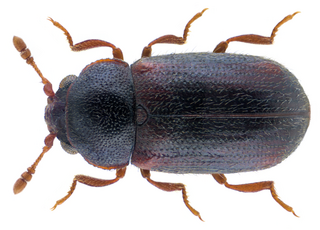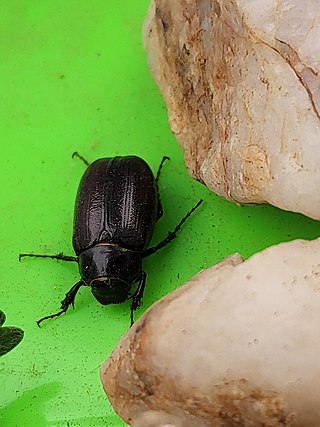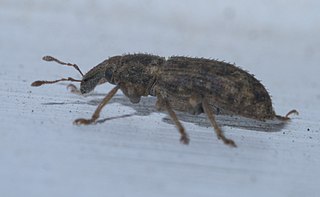
Beetles are insects that form the order Coleoptera, in the superorder Endopterygota. Their front pair of wings are hardened into wing-cases, elytra, distinguishing them from most other insects. The Coleoptera, with about 400,000 described species, is the largest of all orders, constituting almost 40% of described insects and 25% of all known animal species; new species are discovered frequently, with estimates suggesting that there are between 0.9 and 2.1 million total species. Found in almost every habitat except the sea and the polar regions, they interact with their ecosystems in several ways: beetles often feed on plants and fungi, break down animal and plant debris, and eat other invertebrates. Some species are serious agricultural pests, such as the Colorado potato beetle, while others such as Coccinellidae eat aphids, scale insects, thrips, and other plant-sucking insects that damage crops.

The rove beetles are a family (Staphylinidae) of beetles, primarily distinguished by their short elytra that typically leave more than half of their abdominal segments exposed. With roughly 63,000 species in thousands of genera, the group is currently recognized as the largest extant family of organisms. It is an ancient group, with fossilized rove beetles known from the Triassic, 200 million years ago, and possibly even earlier if the genus Leehermania proves to be a member of this family. They are an ecologically and morphologically diverse group of beetles, and commonly encountered in terrestrial ecosystems.

Sphaerites is a genus of beetles, the only genus in the family Sphaeritidae, sometimes called the false clown beetles. There are five known species, which are widespread in temperate areas of the Northern Hemisphere, found in forested or upland areas.

Pleocoma is the only extant genus of rain beetles and is endemic to the Pacific states of North America. Fossil remains of Pleocoma have been found in the Yixian Formation in China, suggesting beetles in this genus have existed in something like their present form since at least the Cretaceous period. There are 27 described species in Pleocoma.

Heteroceridae, the variegated mud-loving beetles, are a widespread and relatively common family of beetles found on every continent except for Antarctica.

Anthicus is a genus of antlike flower beetles in the family Anthicidae. There are at least 100 described species in Anthicus.

Calathus is a genus of ground beetle native to the Palearctic, the Near East and North Africa. There are at least 190 described species in Calathus.

Cassida is a large Old World genus of tortoise beetles in the subfamily Cassidinae. The natural history of Cassida sphaerula in South Africa is a typical life cycle. Several species of Cassida are important agricultural pests, in particular C. vittata and C. nebulosa on sugar beet and spinach. The thistle tortoise beetle has been used as a biological control agent against Canada thistle.

Ataenius is a genus of aphodiine dung beetles in the family Scarabaeidae. There are at least 290 described species in Ataenius.

Clivina is a genus of ground beetle native to the Palearctic, the Nearctic, the Near East and North Africa. There are more than 600 described species in Clivina.

Sphindidae is a family of beetles, in the suborder Polyphaga. They are also known as slime mold beetles due to their exclusive feeding on slime molds during adult and larval stages, other aspects of their life history are obscure. Palaeontological discoveries since 2015 have added to the geologic history of Sphindidae, including the discovery of Libanopsis, placed in the extinct subfamily Libanopsinae.

Diplotaxis is a large genus of scarab beetles in the subfamily Melolonthinae. There are at least 250 described species in Diplotaxis distributed over North and Central America.

Cis is a genus of tree-fungus beetles in the family Ciidae. There are at least 150 described species in Cis.
Hiletinae is a subfamily of beetles in the family Carabidae, containing 21 species in two genera. All of the species in the genus Hiletus, as well as 6 species in Eucamaragnathus, live in Africa. The other species in Eucamaragnathus live in either Southeast Asia and India, or in South America.

Margarinotus is a genus of clown beetles in the family Histeridae. There are at least 110 described species in Margarinotus.

Serica is a genus from the group of May beetles and junebugs in the family Scarabaeidae. There are at least 100 described species in Serica.

Malthodes is a genus of soldier beetles in the family Cantharidae. There are at least 120 described species in Malthodes.

Listronotus is a genus of underwater weevils in the family Curculionidae. There are at least 100 described species in Listronotus.

Limnichidae, commonly called minute marsh-loving beetles, is a family of beetles belonging to Byrrhoidea. There are at least 30 genera and 350 described species in Limnichidae. They are found worldwide, with the greatest diversity in tropical regions. Most species seem to be associated with water-adjacent habitats, such as riparian and coastal locations, though many species are likely fully terrestrial, with some species being associated with leaf litter and arboreal habitats. Species with known diets feed on moss or algae. The oldest fossils of the family are known from mid-Cretaceous Burmese amber from Myanmar.

Eucamaragnathus is a genus of ground beetles in the subfamily Hiletinae.



















